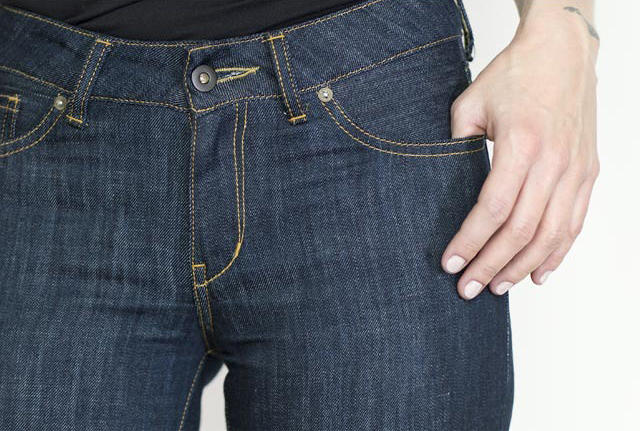Buying a pair of jeans as a woman can be maddening. Don't believe me? Look at this sizing chart. If I were to try to buy my quite normally shaped wife a pair of jeans using this chart, I'd have to decide whether to go with the size of her waist (which would make her one of the smallest sizes on the chart) or her hips (which would make her one of the largest). And my wife is no freakish outlier. The truth is that many women have never worn a pair of jeans that fits them correctly.
Enter Crystal Beasley. A former web designer for Mozilla, Beasley thinks that she can fix the broken women's sizing system. Her solution is Qcut, an Oregon-based company founded by Beasley that aims to be the Warby Parker of denim, shipping made-to-order blue jeans straight to your door that will fit perfectly every time. All for less than a pair of designer jeans you'd buy in a shop, and that probably wouldn't fit you right anyway.

Sizing women today
"The current sizing system is stupid," Beasley tells me. "Fashion is all about self-expression, and art, and subculture, and the way you want to present yourself to the world. Those are amazing things, and yet we spend so much of our energy trying things on, because we can't trust what it says on the back of a tag." But why?
As anyone who has ever discovered that they are a size 6 at the Gap and a size 8 at Banana Republic knows, there is no universal sizing system. According to Beasley, clothes are actually sized by the company's demographic. Using the proportions of their average customer as a baseline, a brand will then determine the sizes of their entire clothing line. This makes it easier to estimate how much it will cost to manufacture clothing, and predict how much of each size to make.
But this "average" customer around which all of a brand's clothing is being sized doesn't actually exist. He or she is a mathematical mannequin constructed by blurring together the body types of countless real customers. (For women, the problem is even worse, because while men's fashion tends to be baggier and more forgiving, women's clothes are generally designed to be tight, especially jeans.)

This is why a pair of size 6 jeans that fits in one store won't fit you in another. So why don't clothing brands just offer a greater variety of sizes? Because that would hike up costs. According to Beasley, it would take around 400 different jean sizes to fit 99% of women. "Even if it made sense for them to do so, brick-and-mortar stores just don't have the room to stock that number of sizes," Beasley says. And if they did, mass-manufacturing such a diverse palette of jean sizes would be a nightmare.
Qcut's solution
So how's Qcut going to get around the problem? First, the company isn't going to mass-manufacture anything. Every pair of Qcut jeans will be made only after the order has been received, then shipped directly to the buyer. This allows every pair to be custom-sized while keeping overhead low: unlike most jean makers, Qcut doesn't have to worry about storage warehouses or retail markup. Qcut jeans won't be cheap—they'll cost between $170 and $200 a pair, although you can preorder a pair on Kickstarter now starting at just $100—but they'll still be cheaper and fit better than designer jeans of a similar quality.
As for how Qcut plans to guarantee a pair of perfectly fitting jeans: When a customer orders a pair of jeans from Qcut, she is first asked what size she thinks she is, then asked to enter her height, weight, bra size, and foot size. The correlation between height and foot size, for example, is enough to statistically predict the length of your leg and how high your waist is. Likewise, metrics like weight, height, and bra size can tell Qcut a lot about how muscular or curvaceous a customer might be. For added accuracy, Qcut will also ask customers in how the jeans they usually purchase don't fit.
Once Qcut's sizing algorithm has done its magic, it matches up each customer with one of the company's 400 possible jean sizes. "These aren't bespoke jeans, and there are definitely going to be some women for whom Qcut jeans won't fit," Beasley admits. "But it'll be less than 1% of women, not the 99% of women who can't find jeans that fit right now."

Now on Kickstarter, Qcut has challenges ahead before it realizes its mission of becoming the Warby Parker of jeans. After spending some time in Cambodia learning about the garment manufacturing industry, Beasley decided that it was important to build a U.S.-based factory where Qcut's jeans can be sewn. Such a factory could be difficult to get off the ground. "You may have heard of a little thing called outsourcing," Beasley laughs. "The truth is, outsourcing the garment industry to Asia means that there aren't a lot of people who have the skills to make jeans in America anymore. So we're going to have to train our staff from scratch."
Even so, Beasley says that Qcut's vision can be realized. Cutting out retailers and inventory fees by selling to customers directly gives Qcut a healthy room to make a profit, even when you add in the additional expense of making the jeans to order in the United States. And if Qcut can do it with jeans, the next step would be to expand to other types of clothes. "We picked jeans as the problem to tackle first because it's really the hardest problem that matters to the largest number of women," Beasley says. "After we solve jeans sizing, everything else is a cakewalk."